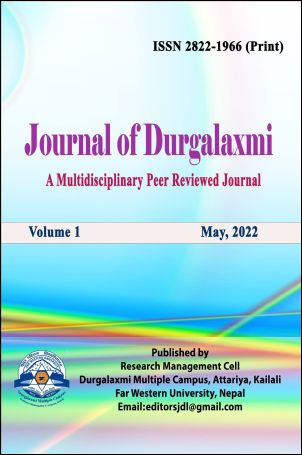Rasa in Deudā: Emotive Expressions of the Folks in Western Nepal
DOI:
https://doi.org/10.3126/jdl.v1i1.57101Keywords:
Deudā, Far Western Nepal, folklore, Indian aesthetics, rasa theoryAbstract
In recent years, many authors have shed light on the hidden world of folklore particularly on folk songs seeking to re-envision the traditions and practices of the traditional society. The present research on a folk song of Far Western Nepal, i.e., deudā holds special promises for analyzing it in the light of rasa theory. The study reflects upon the theory of rasa, as propounded in Indian aesthetics, and attempts to make an assessment of it in relation to deudā song using qualitative method. The main intention of this study is to see how the song lets out the various common emotions (rasas) of the people dwelling in some parts of Far Western Nepal. It examines how different types or forms of rasa function in various deudā songs. Particular emphasis is placed on analyzing the songs in terms of nine rasas. The findings of this research showed that the deudā song is loaded with the feeling of the throbbing hearts of the people of the region with their emotions of pain, pathos, suffering, misery, hardships, compassion, mercy, romance, love, humor, heroism, fury or anger, disgust, wonder, horror and peace. The songs reflect the ethnic culture and tradition of the people and their experiences in the real sense.
Downloads
Downloads
Published
How to Cite
Issue
Section
License
Copyright (c) 2022 Narendra Bahadur Air

This work is licensed under a Creative Commons Attribution-NonCommercial 4.0 International License.
CC BY-NC: This license allows reusers to distribute, remix, adapt, and build upon the material in any medium or format for noncommercial purposes only, and only so long as attribution is given to the creator.




